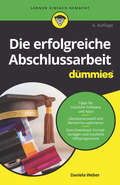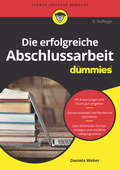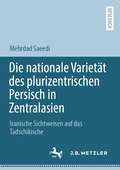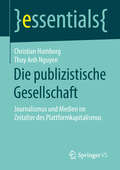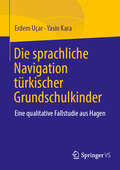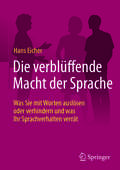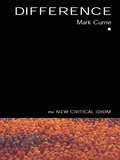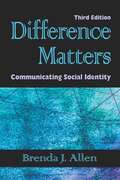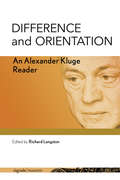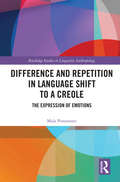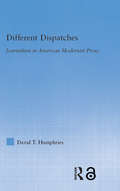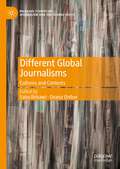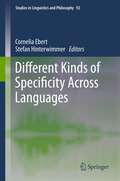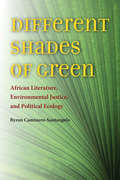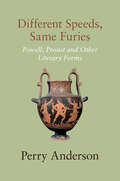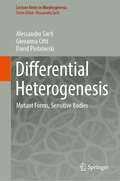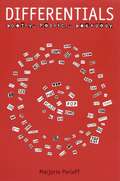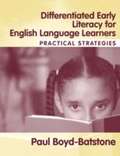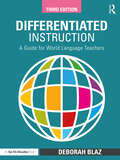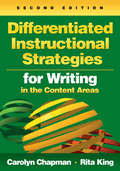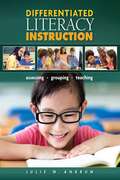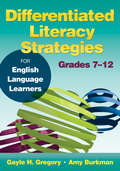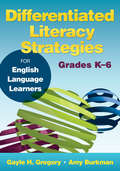- Table View
- List View
Die erfolgreiche Abschlussarbeit für Dummies (Für Dummies)
by Daniela WeberDie letzte Hürde im Studium ist manchmal die schwerste: die Abschlussarbeit. Welches Thema passt am besten? Wie gliedern Sie Ihre Arbeit am sinnvollsten? Was hat es mit der Quellenarbeit auf sich? Wie gestalten Sie Ihren Empirie-Teil? Daniela Weber zeigt Ihnen, wie Sie mit dem Druck fertig werden und welches Handwerkszeug für Sie wichtig ist - unabhängig davon, in welchem Fach Sie Ihren Abschluss machen.
Die erfolgreiche Abschlussarbeit für Dummies (Für Dummies)
by Daniela WeberDie letzte Hürde im Studium ist manchmal die schwerste: die Abschlussarbeit. Welches Thema passt am besten? Wie gliedern Sie Ihre Arbeit am sinnvollsten? Was hat es mit der Quellenarbeit auf sich? Wie gestalten Sie Ihren Empirie-Teil? Daniela Weber zeigt Ihnen, wie Sie mit dem Druck fertig werden und welches Handwerkszeug für Sie wichtig ist - unabhängig davon, in welchem Fach Sie Ihren Abschluss machen.
Die nationale Varietät des plurizentrischen Persisch in Zentralasien: Iranische Sichtweisen auf das Tadschikische
by Mehrdad SaeediDer Gegenstand dieser Studie ist tadschikisches Persisch in Zentralasien aus der iranischen Sichtweise. Die persische Sprache gilt als prominenteste iranische Sprache in der indoeuropäischen Sprachfamilie mit einer über tausendjährigen Literaturgeschichte, und nach soziolinguistischen Maßstäben ist sie plurizentrisch, also in mehreren Ländern vorkommend. Im 20. Jahrhundert und von der Sowjet-Ära an gewann Zentralasien für die Entwicklung der persischen Sprache erneut an Relevanz, während traditionellerweise Iran — bis 1935 „Persien“ genannt — als dominantes Sprachzentrum des plurizentrischen Persisch betrachtet wurde und noch wird. Genau darin ist der Untersuchungsfokus dieser Arbeit begründet, nämlich: Wie nehmen die iranischen Sprecher und die Kultureliten Irans die Entwicklung, gar Abstandnahme einer sog. nationalen Varietät von anderen Varietäten ein und derselben Einzelsprache wahr?
Die publizistische Gesellschaft: Journalismus und Medien im Zeitalter des Plattformkapitalismus (essentials)
by Christian Humborg Thuy Anh NguyenIn diesem essential wird der radikale Wandel der Medien und des Journalismus durch den Aufstieg der Plattformen beschrieben. Es wird gezeigt, wie neue Akteure mit neuen Herangehensweisen auf die Bühne treten. Denn durch die aufgezeigten Veränderungen kann jeder Mensch ohne besonderen Sachverstand weltweit publizieren. Dies verändert grundlegend die Produktionsweisen und Geschäftsmodelle der Medien und des Journalismus selbst, denn jeder Mensch wird zum Publizisten. Die Plattformen diktieren die Spielregeln wer publiziert, wie publiziert wird und wer damit Geld verdienen kann. Dies ist aber nicht nur Bedrohung, sondern auch eine große Chance für den Journalismus.
Die sprachliche Navigation türkischer Grundschulkinder: Eine qualitative Fallstudie aus Hagen
by Erdem Uçar Yasin KaraDieses Buch untersucht die sprachliche Orientierung und Bewältigungsstrategien türkischstämmiger Grundschulkinder in einem deutschen Schulkontext. Im Zentrum steht eine qualitative Fallstudie aus Hagen, die aufzeigt, wie Kinder zwischen Erst- und Zweitsprache navigieren. Die Ergebnisse liefern praxisrelevante Erkenntnisse für Sprachförderung und interkulturelle Bildungsarbeit.
Die verblüffende Macht der Sprache: Was Sie mit Worten auslösen oder verhindern und was Ihr Sprachverhalten verrät
by Hans EicherDieses Buch beschreibt die Mechanismen der Sprachverarbeitung im Gehirn – dem Dreh- und Angelpunkt für die Wortwirkung. Dort wird entschieden, was Worte beim Empfänger auslösen und welche Reaktionsketten sein Verhalten triggern. Worte wirken im Gehirn wie ein Medikament – nur schneller und zuverlässiger. Das Wissen um diese Mechanismen macht jede Kommunikation wirksamer und einfacher. Zahlreiche reale Beispiele führen zu sofortigen Aha-Erlebnissen. Sie illustrieren eindrucksvoll, wie machtvoll Worte sind, was sie bei Mitarbeitern oder Verhandlungspartnern auslösen können und zeigen, wie sie mit besserer Wirkung eingesetzt werden – im Berufsleben wie in vielen anderen Lebenssituationen.Nicht zuletzt verraten Worte immer etwas über den Menschen, der sie ausspricht. Oftmals mehr, als diesem lieb sein kann. Dieses Buch vermittelt Ihnen, wie Sie aus dem Sprachverhalten eines Menschen die „DNA“ seiner Persönlichkeit erkennen und sein Verhalten entschlüsseln. Die 2. Auflage wurde sorgfältig durchgesehen und korrigiert.
Die österreichische kaiserliche Zensur und die böhmische periodische Presse, 1848-71: Die destruktive Arbeit der Oppositionspresse ist furchterregend
by Jeffrey T. LeighDieses Buch analysiert die Pressepolitik in Böhmen von den Revolutionen von 1848 bis zur Tábory-Zeit (1867-71). Nach den Revolutionen erwies sich der habsburgische Staat keineswegs als historisches Relikt, sondern vielmehr als kühn und innovativ, indem er liberale Reformen einführte, vor allem im Bereich der Rechtsstaatlichkeit. Diese Reformen halfen ihm zwar, die unmittelbaren Herausforderungen zu überstehen, doch schufen sie paradoxerweise ein Umfeld, in dem die periodische Presse auch in der Ära des Neoabsolutismus weiterhin die für die Revolution emblematischen Perspektiven vertrat. Dieses neue rechtliche Umfeld begünstigte die Entstehung der bürgerlichen Öffentlichkeit, wie sie Jürgen Habermas theoretisiert, und die politischen Bewegungen, die zu ihrem Untergang beitragen sollten, wie die Tábory-Kampagne von 1867-71 zeigte. An der Schnittstelle zwischen Zivilgesellschaft und Staat standen die für die öffentliche Ordnung und Sicherheit zuständigen habsburgischen Landesbeamten. Sie machten die Erfahrung, dass sie die vom kaiserlichen Zentrum auferlegten Ideale der Rechtsstaatlichkeit und ihre eigenen vitalen Sorgen um den Fortbestand der Monarchie in Einklang bringen mussten. Die vorliegende Arbeit konzentriert sich erstmals auf die Rolle dieser Beamten, die bestimmten, was im Druck erscheinen durfte und was nicht.
Difference (The New Critical Idiom)
by Mark CurrieDifference is one of the most influential critical concepts of recent decades. Mark Currie offers a comprehensive account of the history of the term and its place in some of the most influential schools of theory of the past four decades, including post-structuralism, deconstruction, new historicism, psychoanalysis, French feminism and postcolonialism. Employing literary case studies throughout, Difference provides an accessible introduction to a term at the heart of today's critical idiom.
Difference Matters: Communicating Social Identity
by Brenda J. AllenThis captivating book analyzes six salient categories of social identity (gender, race, social class, disability, sexuality, and age) and why difference within and between those categories matter. Brenda J. Allen provides overviews of sociohistorical developments and their impact on how people perceive and treat one another. She explains how communication constitutes social identity and explores relationships among social identity, discourse, and power dynamics. Allen's book has motivated thousands of individuals in university classes/programs and a variety of other organizations. She offers life-changing guidance in harnessing the potential of diverse perspectives—whether to improve interpersonal relationships and workplace communication or to build a more just society. Difference Matters: Communicating Social Identity invites and induces readers to value and appreciate difference. Allen covers complex and sensitive topics with an ease that inspires others to approach potentially threatening situations with an open mind and heart. Her frank discussions of the effects of dominant belief systems on her own behaviors encourage and reassure the audience to engage in self-reflection. Difference matters to everyone. Establishing meaningful dialogue begins with curiosity about differing perspectives, empathy for others, and cultural humility. Allen addresses the uncertainty and anxiety too often connected with difference, advises mindfulness to reveal the hidden associations connected with stereotypes, and urges proactivity to challenge and change mainstream meanings of difference. She also provides tools and techniques to help readers apply lessons learned.
Difference and Orientation: An Alexander Kluge Reader (signale|TRANSFER: German Thought in Translation)
by Alexander KlugeAlexander Kluge is one of contemporary Germany's leading intellectuals and artists. A key architect of the New German Cinema and a pioneer of auteur television programming, he has also cowritten three acclaimed volumes of critical theory, published countless essays and numerous works of fiction, and continues to make films even as he expands his video production to the internet. Despite Kluge's five decades of work in philosophy, literature, television, and media politics, his reputation outside of the German-speaking world still largely rests on his films of the 1960s, 70s, and 80s. With the aim of introducing Kluge's heterogeneous mind to an Anglophone readership, Difference and Orientation assembles thirty of his essays, speeches, glossaries, and interviews, revolving around the capacity for differentiation and the need for orientation toward ways out of catastrophic modernity. This landmark volume brings together some of Kluge's most fundamental statements on literature, film, pre- and post-cinematic media, and social theory, nearly all for the first time in English translation. Together, these works highlight Kluge's career-spanning commitment to unorthodox, essayistic thinking.
Difference and Repetition in Language Shift to a Creole: The Expression of Emotions (Routledge Studies in Linguistic Anthropology)
by Maïa PonsonnetIn today’s global commerce and communication, linguistic diversity is in steady decline across the world as speakers of smaller languages adopt dominant forms. While this phenomenon, known as ‘language shift’, is usually regarded as a loss, this book adopts a different angle and addresses the following questions: What difference does using a new language make to the way speakers communicate in everyday life? Can the grammatical and lexical architectures of individual languages influence what speakers express? In other words, to what extent does adopting a new language alter speakers’ day-to-day communication practices, and in turn, perhaps, their social life and world views? To answer these questions, this book studies the expression of emotions in two languages on each side of a shift: Kriol, an English-based creole spoken in northern Australia, and Dalabon (Gunwinyguan, non-Pama-Nyungan), an Australian Aboriginal language that is being replaced by Kriol. This volume is the first to explore the influence of the formal properties of language on the expression of emotions, as well as the first description of the linguistic encoding of emotions in a creole language. The cross-disciplinary approach will appeal to linguists, psychologists, anthropologists and other social scientists.
Different Dispatches: Journalism in American Modernist Prose (Literary Criticism and Cultural Theory)
by David T. HumphriesIn "Different Dispatches", David Humphries brings together in a new way a diverse group of well-known American writers of the inter-war period including: Willa Cather, Sherwood Anderson, Ernest Hemmingway, Zora Neale Hurston, James Agee and Robert Penn Warren. He demonstrates how these writers engage journalism in creating innovative texts that address mass culture as well as underlying cultural conditions. The book will be of interest to readers approaching these well-known authors for the first time or for scholars grappling with larger issues of cultural production and reception.
Different Global Journalisms: Cultures and Contexts (Palgrave Studies in Journalism and the Global South)
by Saba Bebawi Oxana OnilovThis edited collection seeks to better understand how journalism across cultures differs, presenting an in-depth exploration of global practices that departs from the typical Western-centric approach. Journalists across the world are trained, generally speaking, within Western models of reporting and are taught to do so as a practice where reporters need to aspire and aim for. Yet what such training is short of achieving is teaching reporters how to 'do' journalism within their own environments. In turn, what is required is a method of journalistic training and practice that is reflective of the actual practice reporters encounter on the ground. In order to do so, a better understanding of how journalism is practised in different parts of the world, the context surrounding such practices, the issues and challenges associated, and the positive practices that Western journalism can offer, is necessary. Promoting and deploying a culturally-specific and politically-relevant journalism, this book provides just that.
Different Kinds of Specificity Across Languages
by Cornelia Ebert Stefan HinterwimmerThis anthology of papers analyzes a range of specificity markers found in natural languages. It reflects the fact that despite intensive research into these markers, the vast differences between the markers across languages and even within single languages have been less acknowledged. Commonly regarded specific indefinites are by no means a homogenous class, and so this volume fills a gap in our understanding of the semantics and pragmatics of indefinites. The papers explore differences and similarities among these specificity markers, concentrating on the following issues: whether specificity is a purely semantic or also a pragmatic notion; whether the contribution of specificity markers is located on the level of the at-issue content; whether some kind of speaker-listener asymmetry concerning the identification of the referent is involved; and the behavioral scope of these indefinites in the context of other quantifiers, negation, attitude verbs, and intensional/modal operators.
Different Shades of Green: African Literature, Environmental Justice, and Political Ecology (Under the Sign of Nature: Explorations in Ecocriticism)
by Byron Caminero-SantangeloEngaging important discussions about social conflict, environmental change, and imperialism in Africa, Different Shades of Green points to legacies of African environmental writing, often neglected as a result of critical perspectives shaped by dominant Western conceptions of nature and environmentalism. Drawing on an interdisciplinary framework employing postcolonial studies, political ecology, environmental history, and writing by African environmental activists, Byron Caminero-Santangelo emphasizes connections within African environmental literature, highlighting how African writers have challenged unjust, ecologically destructive forms of imperial development and resource extraction. Different Shades of Green also brings into dialogue a wide range of African creative writing-including works by Chinua Achebe, Ngg wa Thiong'o, Bessie Head, Nadine Gordimer, Zakes Mda, Nuruddin Farah, Wangari Maathai, and Ken Saro-Wiwa-in order to explore vexing questions for those involved in the struggle for environmental justice, in the study of political ecology, and in the environmental humanities, urging continued imaginative thinking in effecting a more equitable, sustain¬able future in Africa.
Different Speeds, Same Furies: Powell, Proust and other Literary Forms
by Perry AndersonAn exploration of Marcel Proust and Anthony Powell's greatest literary achievements.There are few writers about whom opinions diverge so widely as Anthony Powell, whose Dance to the Music of Time sequence is one of the most ambitious literary constructions in the English language. In Different Speeds, Same Furies, Perry Anderson measures Powell&’s achievement against Marcel Proust&’s celebrated In Search of Lost Time.The literature on Dance is a drop in the ocean compared to that on Proust. Yet in construction of plot and depiction of character, Anderson ranks Powell above him. How much do particular advantages of this kind matter, and why is Powell an odd man out in English letters? At once so similar and dissimilar, the intricate retrospectives of the two novelists on bohemia and Society, upbringing and mortality, relationships and personality, invite interrelated judgements.The closing chapters of Different Speeds, Same Furies reach beyond their handlings of time to chart the historical novel from Waverley to Underworld, and the breakthrough in epistolatory fiction of Montesquieu&’s Persian Letters, held together by what its author described as &‘a secret chain which remains, as it were, invisible&’.
Differential Heterogenesis: Mutant Forms, Sensitive Bodies (Lecture Notes in Morphogenesis)
by Alessandro Sarti Giovanna Citti David PiotrowskiThis book describes about unlike usual differential dynamics common in mathematical physics, heterogenesis is based on the assemblage of differential constraints that are different from point to point. The construction of differential assemblages will be introduced in the present study from the mathematical point of view, outlining the heterogeneity of the differential constraints and of the associated phase spaces, that are continuously changing in space and time. If homogeneous constraints well describe a form of swarm intelligence or crowd behaviour, it reduces dynamics to automatisms, by excluding any form of imaginative and creative aspect. With this study we aim to problematize the procedure of homogeneization that is dominant in life and social science and to outline the dynamical heterogeneity of life and its affective, semiotic, social, historical aspects. Particularly, the use of sub-Riemannian geometry instead of Riemannian one allows to introduce disjointed and autonomous areas in the virtual plane. Our purpose is to free up the dynamic becoming from any form of unitary and totalizing symmetry and to develop forms, action, thought by means of proliferation, juxtaposition, and disjunction devices. After stating the concept of differential heterogenesis with the language of contemporary mathematics, we will face the problem of the emergence of the semiotic function, recalling the limitation of classical approaches (Hjelmslev, Saussure, Husserl) and proposing a possible genesis of it from the heterogenetic flow previously defined. We consider the conditions under which this process can be polarized to constitute different planes of Content (C) and Expression (E), each one equipped with its own formed substances. A possible (but not unique) process of polarization is constructed by means of spectral analysis, that is introduced to individuate E/C planes and their evolution. The heterogenetic flow, solution of differential assemblages, gives rise to forms that are projected onto the planes, offering a first referring system for the flow, that constitutes a first degree of semiosis.
Differentials: Poetry, Poetics, Pedagogy
by Marjorie PerloffA new collection of essays from a distinguished critic of contemporary poetry. Marjorie Perloff is one of the foremost critics of contemporary American poetry writing today. Her works are credited by many with creating and sustaining new critical interest not only in the work of major modernist poets such as Yeats, Pound, Eliot, and Williams but also in the postwar tradition of American poetic innovation that ranges from the Black Mountain poets, through the New York School and concrete poetry, to the Language Poets of the 1980s and '90s. In Differentials, Perloff explores and defends her belief in the power of close reading, a strategy often maligned as reactionary in today's critical climate but which, when construed differentially, is vital, she believes, to any true understanding of a literary or poetic work, irrespective of how traditional or experimental it is. Perloff also examines key issues in modernism, from Eliot's conservative poetics and Pound's nominalism to translation theory (Wittgenstein, Eugene Jolas, Haroldo de Campos), and the contemporary avant garde, as represented by writers like Susan Howe, Tom Raworth, Rae Armantrout, Ron Silliman, Ronald Johnson, Caroline Bergvall, and Kenneth Goldsmith. Ultimately, Perloff's most important offerings inDifferentialsare her remarkably original reflections on the aesthetic process: on how poetry works, and what it means, in and for our time.
Differentiated Early Literacy for English Language Learners: Practical Strategies
by Paul Boyd-BatstoneBoyd-Batstone (language and literacy, California State U. , Long Beach) offers strategies and activities that focus on meeting the early literacy demands of the No Child Left Behind Act. He differentiates the strategies according to five levels of language proficiency and includes writing strategies with assessment rubrics that match those levels. His suggestions address vocabulary development, the use of computer technology, and parental involvement.
Differentiated Instruction: A Guide for World Language Teachers
by Deborah BlazIn the third edition of a bestseller, author Deborah Blaz helps you differentiate lessons for your world language students based on their learning styles, interests, prior knowledge, and comfort zones. This practical book uses brain-based teaching strategies to help students of all ability levels thrive in a rigorous differentiated learning environment. Each chapter provides classroom-tested activities and tiered lesson plans to help you teach vocabulary, speaking, listening, reading, and writing in world language classes in ways that are interactive, engaging, and effective for all learners. Features new to this edition include: activities aligned with the latest ACTFL and CEFR standards ideas and activities for project-based learning, virtual learning, and learning with digital tools, such as ChatGPT up-to-date latest guidance on learning styles and using variety in teaching more photocopiable forms, checklists, and handouts for suggested activities You’ll also learn how to differentiate assessment effectively to help all students show their full potential. Classroom-ready tools and templates can be downloaded as free support material from our website (www.routledge.com/9781032258287) for immediate use.
Differentiated Instruction: A Guide for World Language Teachers
by Deborah Blaz• Updated with new tools and easy-to-implement strategies throughout • New emphasis on teaching online and using digital tools • Addresses differentiation in all areas of language teaching, from grammar to vocabulary to culture
Differentiated Instructional Strategies for Writing in the Content Areas
by Carolyn M. Chapman Rita S. KingUse writing as a tool for helping students master content! This updated edition of a best-selling book offers explicit strategies for differentiating writing instruction to help students learn content and develop as writers. The authors address how to create a climate for writing, use flexible groupings, differentiate instruction, and assess student writing. Offering new strategies and activities for effective writing instruction, this second edition: Covers informational text writing and critical thinking skills Includes guidance for working with English language learners Discusses current research about writing and learning Offers expanded coverage of assessment methods and tools
Differentiated Literacy Instruction: Assessing, Grouping, Teaching
by Michael C. McKenna John Z. Strong Zoi A. Philippakos Sharon WapoleThe goal of this book is to answer the question What is differentiated instruction? It offers pre-service and in-service teachers the background and foundational skills they will need to understand, plan for, and achieve effective differentiated literacy instruction in their classrooms, based on individual student needs. Chapters provide essential information about how to analyze and synthesize data from assessments, use the information for grouping students, and then plan and implement differentiated instruction. Many specific, hands-on descriptions and exhibits are provided. Case studies of real classrooms demonstrate effective differentiated instructional techniques. End-of-chapter Practical Application questions allow readers to apply chapter concepts as they learn to motivate and teach diverse learners.
Differentiated Literacy Strategies for English Language Learners, Grades 7–12
by Gayle H. Gregory Amy J. Burkman100 ways to keep adolescent ELLs engaged This versatile handbook is for middle school and high school educators who need to differentiate literacy instruction for adolescent ELL students at various stages of literacy competency. Adapted from the highly successful Differentiated Literacy Strategies for Student Growth and Achievement in Grades 7–12, the authors use brain-based strategies and texts that appeal to older learners who may have had interrupted formal education or come from newly arrived immigrant populations. More than 100 hands-on tools help teachers develop students’ competencies in: Content areas, including vocabulary, concept attainment, and comprehension Technology, such as information searching, evaluation, and synthesis Creative applications and 21st century skills ·
Differentiated Literacy Strategies for English Language Learners, Grades K–6
by Gayle H. Gregory Amy J. BurkmanEffective ways to help ELLs excel The key to successfully teaching English learners is focusing on literacy. Adapted from the highly successful Differentiated Literacy Strategies for Student Growth and Achievement in Grades K–6, this book provides a wealth of practical literacy strategies tailored for students who have had interrupted formal education or come from newly arrived immigrant populations. Teachers will find an instructional and assessment framework designed to promote these critical competencies: Functional literacy in phonics, spelling, and reading; Content-area literacy for vocabulary, concept attainment, and comprehension; Technological literacy for information searching, evaluation, and synthesis; Innovative literacy for creativity, growth, and lifelong learning.
